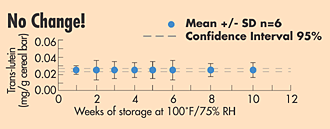Protecting Eye Health
Lutein protects eye health by filtering light, such as the damaging rays of the sun, and by acting as an antioxidant, which helps delay the effects of aging. Lutein is obtained from sources outside the body, such as foods and vitamin supplements. Studies show there is a relationship between diets rich in lutein and a decreased risk of age-related macular degeneration (AMD), the leading cause of blindness in people older than 65 years. Additionally, the antioxidant decreases the risk of cataracts and slows their progression.Kemin Foods, Des Moines, a global manufacturer and marketer of natural ingredients for the food, beverage, vitamin and dietary supplement industries, supplies the only purified and patented lutein product with GRAS status on the market. FloraGloLO® lutein, derived from marigolds—the most efficient source of lutein—can be added to certain beverages and food products, without affecting the taste, texture and aroma of a formulation. Typical applications include breakfast and granola bars, cereals, energy bars, energy drinks, fruit drinks, fruit juices, meal replacement drinks, mixed vegetable juices, ready-to-drink tea, soup, yogurt, soy milks, vitamins and dietary supplements. Product forms include 5% beadlets and 20% and 5% liquids.
The company recently conducted studies to measure the stability of its lutein in ready-to-eat (RTE) baked cereals and cereal bar products, to better advise manufacturers on lutein use in foods. The studies focused on physical and organoleptic properties, such as color, taste, aroma, texture and mouthfeel. The trials were conducted at the company's new Functional Foods Applications Center, a state-of-the art facility that allows investigators to carefully study the addition of functional ingredients to foods and beverages.

The baked cereal products were baked at a temperature of 350°F for 15 minutes and then dried at 200°F for 90 minutes. The lutein remained stable in the cereal after six weeks of storage at 100°F and 75% RH (relative humidity). The data suggests the ingredient can remain stable in cereal at room temperature for six months or more.

As lutein and its health properties continue to catch the public eye, manufacturers will respond with an increasing number of lutein-fortified products.
For more information:
Linda Fullmer at 515-248-4000
lfullmer@keminfoods.com
Kemin Foods LC Write in 204